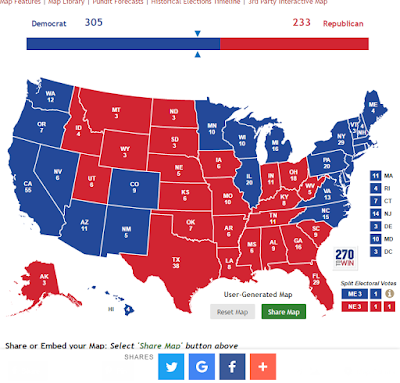It wasn't Jill Stein, and it wasn't Gary Johnson.
It wasn't two candidates, both equally despised and distrusted. It wasn't that the Obama coalition collapsed. It wasn't low turnout - not of blacks, or Latinos, or college-educated white women. It wasn't the God-gap and it wasn't the evangelicals.
It wasn't white racism; it wasn't nativist populism. It wasn't gender hatred. It wasn't dog whistles. It wasn't Putin. It wasn't Roger Stone, and it wasn't Steve Bannon.
None of the above.
It is the internet, and it is the screen by which you are reading my words.
Just as certainly as the 1960 election was transformed by televised national debates, using a technology that has been in place for nearly a decade, the election of 2016 was formed and contoured by a technology that had been around for over 25 years, and had even played a part in earlier rounds of presidential voting.
But it wasn't the effective use of technology that made the election of 2016 what it was. That had occurred 4 years prior, when the Democrats' networked app-based system worked, and the Republicans' ORCA system suffered a complete meltdown.
Instead, it was the hacking of an election. It was the clever use of digital platforms to solve a problem. Think of how the word "hack" is now used amongst coders - one of the premier conferences for budding start-ups is called "Disrupt Hackathon." It means looking at a system, peering into the nuts and bolts, and coming up with an intuition, an inkling of an elegant "hack" to disrupt the layers of conventionalism surrounding a supposed stable system.
It was president-elect Donald J. Trump, star of 14 seasons of The Apprentice and master of the 140-character digital haiku, who devised and deployed this hack.
The hack was elegantly simple - keep every eyeball on you. Say anything, do anything. None of it mattered. The dismissive fact-checking that would come afterwards was part of the hack. The outraged talking heads, the old-world newspapers struggling to become monetized digital platforms, the conventional attacks of 15 Republican contenders and one hot mess of a Democrat - all of it played into the hack.
Truth be told, Hillary Clinton had attempted a hack of her own, years before this campaign had taken shape. She and her husband had different concerns. They were looking for a non-conventional protective layer of digital privacy for matters weighty and trivial. Bill and Hillary Clinton came up with a kludge, clintonemail.com. Their inelegant hack was a basement private mail server with a 280-page instruction manual and nothing better than conventional security. It was a legacy system supporting a Blackberry.
Podesta emails; Cozy Bear and Fancy Bear; Julian Assange; even clintonemail.com, are nothing compared to Donald's elegant hack. It had worked before in a post-modern liberal democracy. Silvio Berlusconi had leveraged his media business acumen and celebrity status into pure political power. Trump had laid the groundwork - 14 seasons with Comcast-NBCUniversal and his old-Manhattan friend was Jeff Zucker, former CEO and President of NBCUniversal and now president of CNN Worldwide.
For most viewers of The Apprentice, Trump might be a rascal and he might be a character out of Sex and the City, but he was watchable. He did fail in the casino industry, he did own beauty pageants, he did appear on Wrestlemania, he did set up a phony university to bilk innocents of their money, he did discriminate in housing practices in the 1970s, he was a sexist pig who loved his daughter in a pervy way - so what? We the audience expect so much less from our celebrities, particularly the ones we get to see "up close and personal." As his celebrity character moved into the political domain, the bar for conduct was accordingly dropped - but just for him.
Donald Trump entertained as the host of a reality TV show. He broke through the wall that is our screens. I write with the utmost respect: Donald Trump hacked the American presidential election system.
There was a second hack, not nearly as significant. That was the hack of one particular social media platform, by creating a near denial-of-service overflow of attention-grabbing tweets. While Trump never got the hang of the RT just right, and the late night Android rants came to a trickle in the waning days of the campaign, Trump brought on fusion between digital video and social media. The mainstream national media was forced to produce daily digests of Trump's tweets (and the occasional Clinton counterpunch) and treated it as news.
But I won't ever call this the Twitter Election of 2016, though it might be the one-and-only time Twitter will matter as much. Four years is a long time for any social media platform. Just ask the owners of MySpace
Instead, I call this the Hacked Election of 2016. And there is no doubt in my mind that this year's "Disrupt Hackathon" winner is Donald J. Trump.

